CBT Intervention: Concepts, Elements, and Evaluation in Public Health
VerifiedAdded on 2023/01/10
|14
|5632
|87
Report
AI Summary
This report delves into Cognitive Behavioral Therapy (CBT) as a public health intervention, focusing on its application to mental health challenges, particularly among young people. It outlines the core concepts and principles of modern public health that underpin the intervention, emphasizing the importance of addressing mental health issues such as anxiety and depression. The report identifies and explains the key elements of CBT, including its therapeutic techniques and the methods used to evaluate its effectiveness. It reviews the existing evidence supporting CBT, assessing its efficacy in improving mental health outcomes. Furthermore, the report examines a specific evaluation of CBT, discussing recommendations derived from the findings. The report highlights the prevalence of mental health issues, the impact of poor mental health on individuals, and the role of public health initiatives in addressing these concerns through interventions like CBT.

Public health
Paraphrase This Document
Need a fresh take? Get an instant paraphrase of this document with our AI Paraphraser
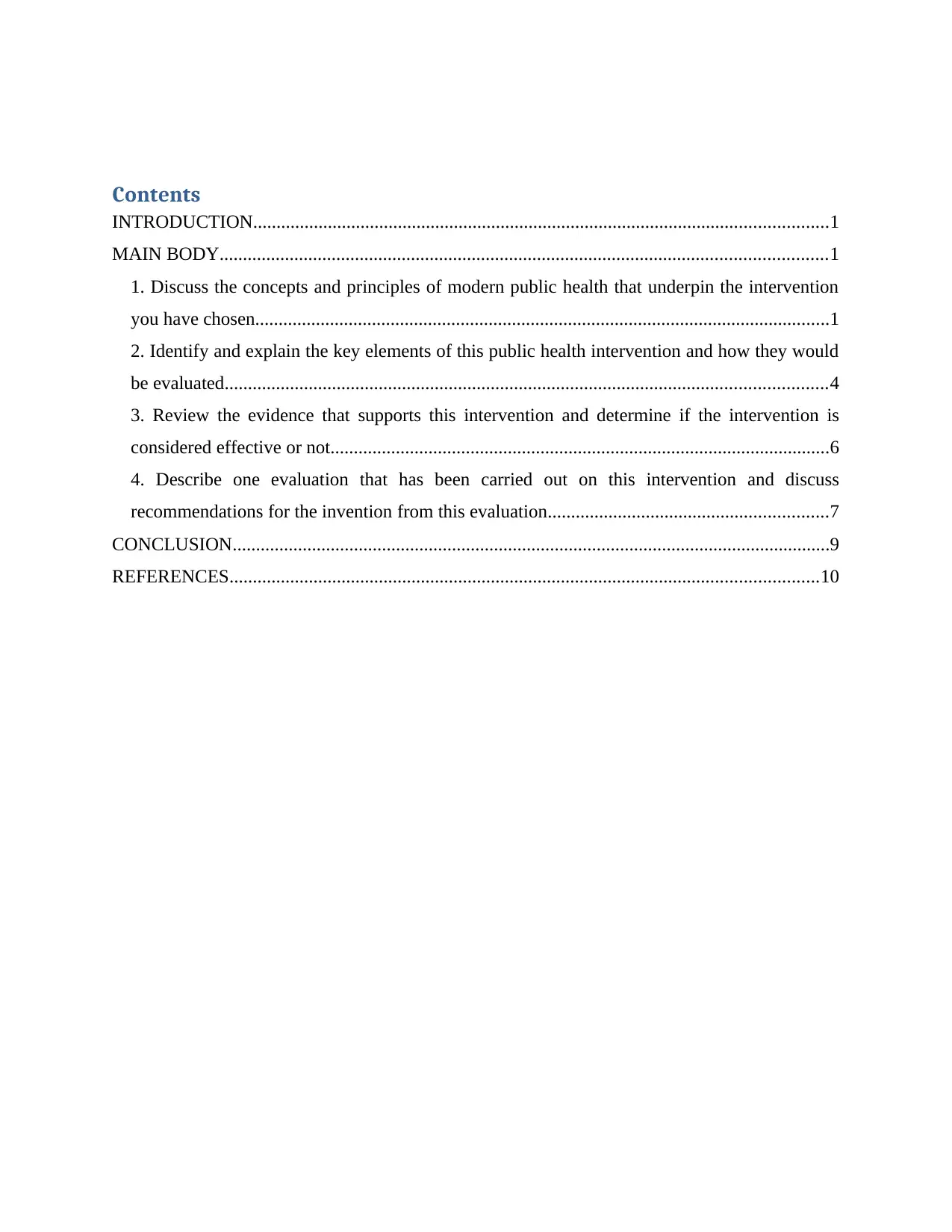
Contents
INTRODUCTION...........................................................................................................................1
MAIN BODY..................................................................................................................................1
1. Discuss the concepts and principles of modern public health that underpin the intervention
you have chosen...........................................................................................................................1
2. Identify and explain the key elements of this public health intervention and how they would
be evaluated.................................................................................................................................4
3. Review the evidence that supports this intervention and determine if the intervention is
considered effective or not...........................................................................................................6
4. Describe one evaluation that has been carried out on this intervention and discuss
recommendations for the invention from this evaluation............................................................7
CONCLUSION................................................................................................................................9
REFERENCES..............................................................................................................................10
INTRODUCTION...........................................................................................................................1
MAIN BODY..................................................................................................................................1
1. Discuss the concepts and principles of modern public health that underpin the intervention
you have chosen...........................................................................................................................1
2. Identify and explain the key elements of this public health intervention and how they would
be evaluated.................................................................................................................................4
3. Review the evidence that supports this intervention and determine if the intervention is
considered effective or not...........................................................................................................6
4. Describe one evaluation that has been carried out on this intervention and discuss
recommendations for the invention from this evaluation............................................................7
CONCLUSION................................................................................................................................9
REFERENCES..............................................................................................................................10
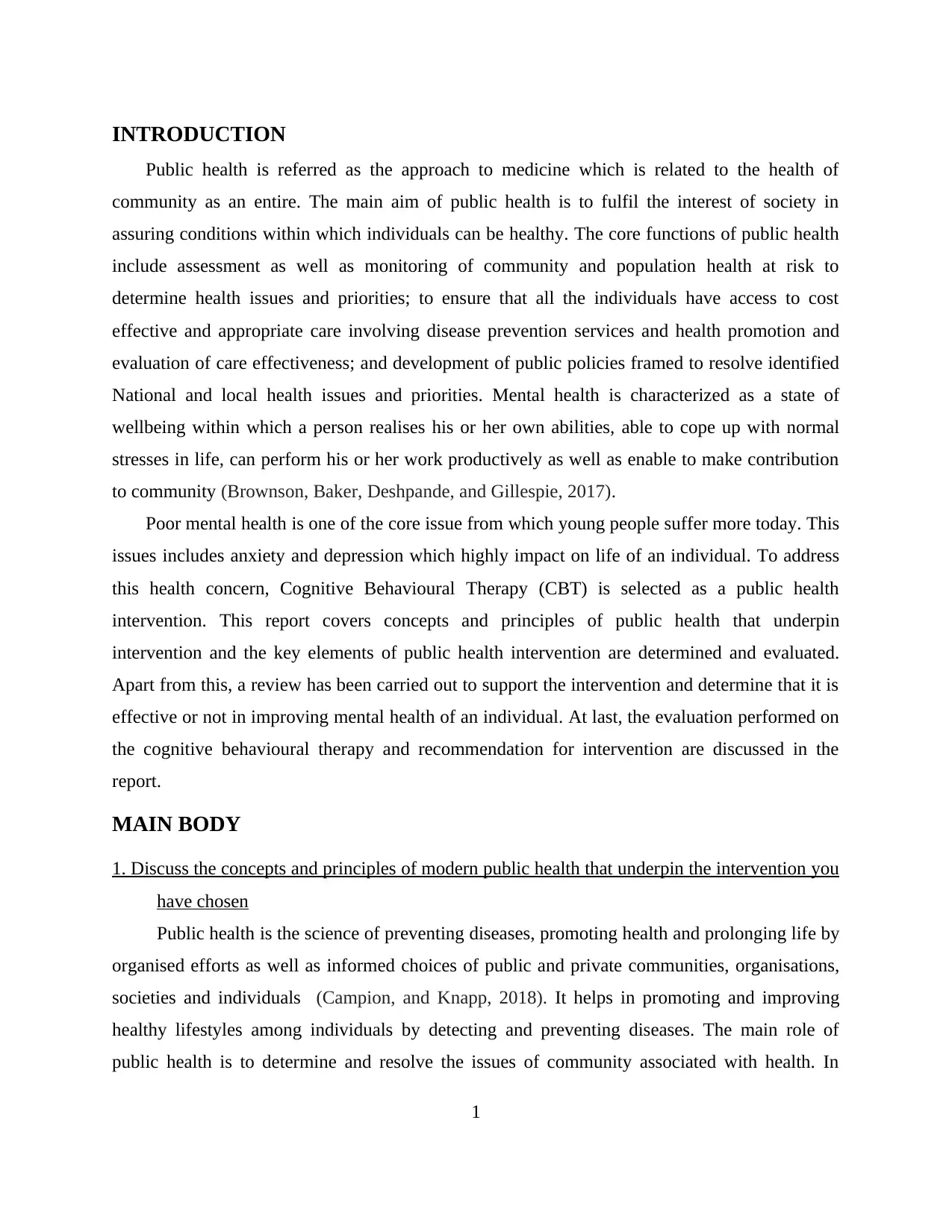
INTRODUCTION
Public health is referred as the approach to medicine which is related to the health of
community as an entire. The main aim of public health is to fulfil the interest of society in
assuring conditions within which individuals can be healthy. The core functions of public health
include assessment as well as monitoring of community and population health at risk to
determine health issues and priorities; to ensure that all the individuals have access to cost
effective and appropriate care involving disease prevention services and health promotion and
evaluation of care effectiveness; and development of public policies framed to resolve identified
National and local health issues and priorities. Mental health is characterized as a state of
wellbeing within which a person realises his or her own abilities, able to cope up with normal
stresses in life, can perform his or her work productively as well as enable to make contribution
to community (Brownson, Baker, Deshpande, and Gillespie, 2017).
Poor mental health is one of the core issue from which young people suffer more today. This
issues includes anxiety and depression which highly impact on life of an individual. To address
this health concern, Cognitive Behavioural Therapy (CBT) is selected as a public health
intervention. This report covers concepts and principles of public health that underpin
intervention and the key elements of public health intervention are determined and evaluated.
Apart from this, a review has been carried out to support the intervention and determine that it is
effective or not in improving mental health of an individual. At last, the evaluation performed on
the cognitive behavioural therapy and recommendation for intervention are discussed in the
report.
MAIN BODY
1. Discuss the concepts and principles of modern public health that underpin the intervention you
have chosen
Public health is the science of preventing diseases, promoting health and prolonging life by
organised efforts as well as informed choices of public and private communities, organisations,
societies and individuals (Campion, and Knapp, 2018). It helps in promoting and improving
healthy lifestyles among individuals by detecting and preventing diseases. The main role of
public health is to determine and resolve the issues of community associated with health. In
1
Public health is referred as the approach to medicine which is related to the health of
community as an entire. The main aim of public health is to fulfil the interest of society in
assuring conditions within which individuals can be healthy. The core functions of public health
include assessment as well as monitoring of community and population health at risk to
determine health issues and priorities; to ensure that all the individuals have access to cost
effective and appropriate care involving disease prevention services and health promotion and
evaluation of care effectiveness; and development of public policies framed to resolve identified
National and local health issues and priorities. Mental health is characterized as a state of
wellbeing within which a person realises his or her own abilities, able to cope up with normal
stresses in life, can perform his or her work productively as well as enable to make contribution
to community (Brownson, Baker, Deshpande, and Gillespie, 2017).
Poor mental health is one of the core issue from which young people suffer more today. This
issues includes anxiety and depression which highly impact on life of an individual. To address
this health concern, Cognitive Behavioural Therapy (CBT) is selected as a public health
intervention. This report covers concepts and principles of public health that underpin
intervention and the key elements of public health intervention are determined and evaluated.
Apart from this, a review has been carried out to support the intervention and determine that it is
effective or not in improving mental health of an individual. At last, the evaluation performed on
the cognitive behavioural therapy and recommendation for intervention are discussed in the
report.
MAIN BODY
1. Discuss the concepts and principles of modern public health that underpin the intervention you
have chosen
Public health is the science of preventing diseases, promoting health and prolonging life by
organised efforts as well as informed choices of public and private communities, organisations,
societies and individuals (Campion, and Knapp, 2018). It helps in promoting and improving
healthy lifestyles among individuals by detecting and preventing diseases. The main role of
public health is to determine and resolve the issues of community associated with health. In
1
⊘ This is a preview!⊘
Do you want full access?
Subscribe today to unlock all pages.

Trusted by 1+ million students worldwide
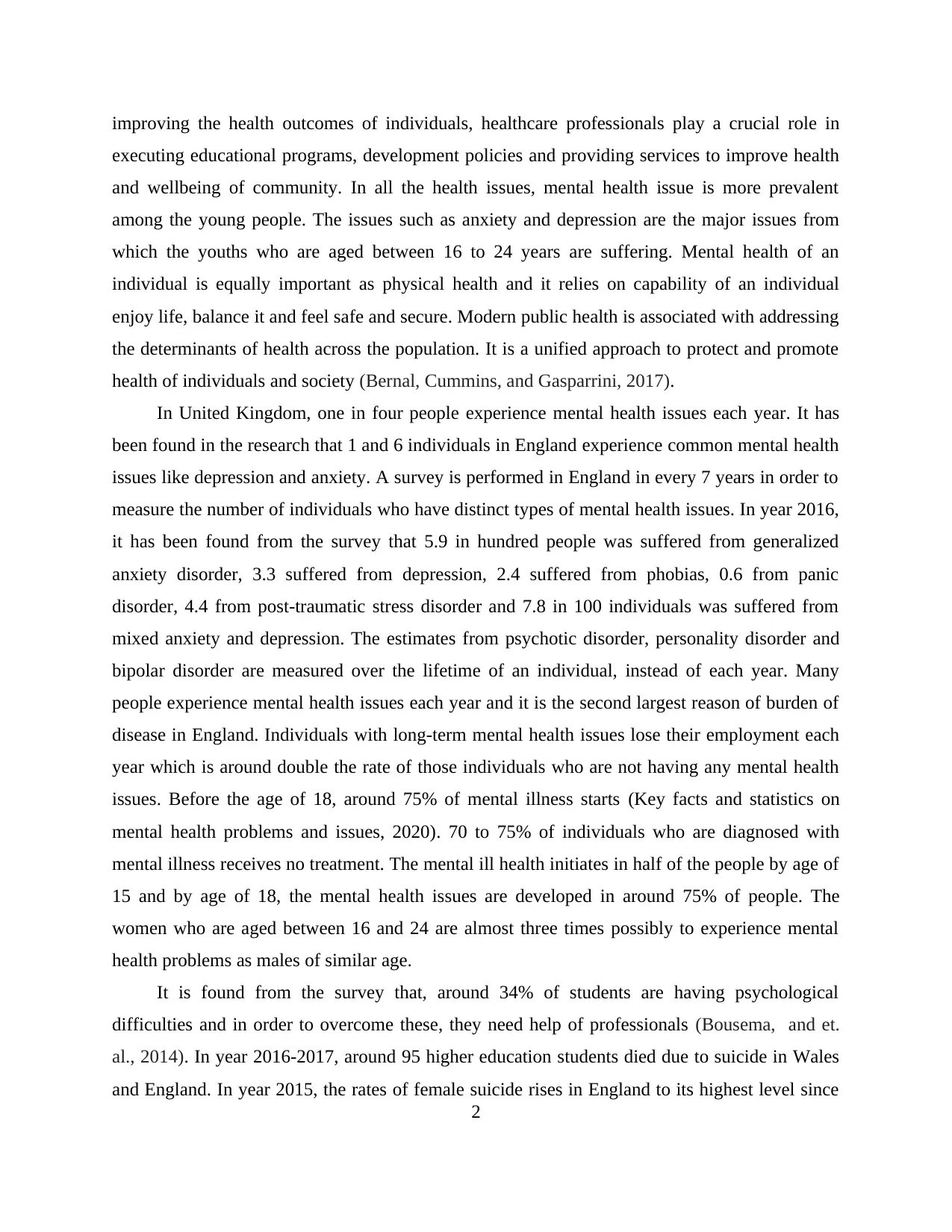
improving the health outcomes of individuals, healthcare professionals play a crucial role in
executing educational programs, development policies and providing services to improve health
and wellbeing of community. In all the health issues, mental health issue is more prevalent
among the young people. The issues such as anxiety and depression are the major issues from
which the youths who are aged between 16 to 24 years are suffering. Mental health of an
individual is equally important as physical health and it relies on capability of an individual
enjoy life, balance it and feel safe and secure. Modern public health is associated with addressing
the determinants of health across the population. It is a unified approach to protect and promote
health of individuals and society (Bernal, Cummins, and Gasparrini, 2017).
In United Kingdom, one in four people experience mental health issues each year. It has
been found in the research that 1 and 6 individuals in England experience common mental health
issues like depression and anxiety. A survey is performed in England in every 7 years in order to
measure the number of individuals who have distinct types of mental health issues. In year 2016,
it has been found from the survey that 5.9 in hundred people was suffered from generalized
anxiety disorder, 3.3 suffered from depression, 2.4 suffered from phobias, 0.6 from panic
disorder, 4.4 from post-traumatic stress disorder and 7.8 in 100 individuals was suffered from
mixed anxiety and depression. The estimates from psychotic disorder, personality disorder and
bipolar disorder are measured over the lifetime of an individual, instead of each year. Many
people experience mental health issues each year and it is the second largest reason of burden of
disease in England. Individuals with long-term mental health issues lose their employment each
year which is around double the rate of those individuals who are not having any mental health
issues. Before the age of 18, around 75% of mental illness starts (Key facts and statistics on
mental health problems and issues, 2020). 70 to 75% of individuals who are diagnosed with
mental illness receives no treatment. The mental ill health initiates in half of the people by age of
15 and by age of 18, the mental health issues are developed in around 75% of people. The
women who are aged between 16 and 24 are almost three times possibly to experience mental
health problems as males of similar age.
It is found from the survey that, around 34% of students are having psychological
difficulties and in order to overcome these, they need help of professionals (Bousema, and et.
al., 2014). In year 2016-2017, around 95 higher education students died due to suicide in Wales
and England. In year 2015, the rates of female suicide rises in England to its highest level since
2
executing educational programs, development policies and providing services to improve health
and wellbeing of community. In all the health issues, mental health issue is more prevalent
among the young people. The issues such as anxiety and depression are the major issues from
which the youths who are aged between 16 to 24 years are suffering. Mental health of an
individual is equally important as physical health and it relies on capability of an individual
enjoy life, balance it and feel safe and secure. Modern public health is associated with addressing
the determinants of health across the population. It is a unified approach to protect and promote
health of individuals and society (Bernal, Cummins, and Gasparrini, 2017).
In United Kingdom, one in four people experience mental health issues each year. It has
been found in the research that 1 and 6 individuals in England experience common mental health
issues like depression and anxiety. A survey is performed in England in every 7 years in order to
measure the number of individuals who have distinct types of mental health issues. In year 2016,
it has been found from the survey that 5.9 in hundred people was suffered from generalized
anxiety disorder, 3.3 suffered from depression, 2.4 suffered from phobias, 0.6 from panic
disorder, 4.4 from post-traumatic stress disorder and 7.8 in 100 individuals was suffered from
mixed anxiety and depression. The estimates from psychotic disorder, personality disorder and
bipolar disorder are measured over the lifetime of an individual, instead of each year. Many
people experience mental health issues each year and it is the second largest reason of burden of
disease in England. Individuals with long-term mental health issues lose their employment each
year which is around double the rate of those individuals who are not having any mental health
issues. Before the age of 18, around 75% of mental illness starts (Key facts and statistics on
mental health problems and issues, 2020). 70 to 75% of individuals who are diagnosed with
mental illness receives no treatment. The mental ill health initiates in half of the people by age of
15 and by age of 18, the mental health issues are developed in around 75% of people. The
women who are aged between 16 and 24 are almost three times possibly to experience mental
health problems as males of similar age.
It is found from the survey that, around 34% of students are having psychological
difficulties and in order to overcome these, they need help of professionals (Bousema, and et.
al., 2014). In year 2016-2017, around 95 higher education students died due to suicide in Wales
and England. In year 2015, the rates of female suicide rises in England to its highest level since
2
Paraphrase This Document
Need a fresh take? Get an instant paraphrase of this document with our AI Paraphraser
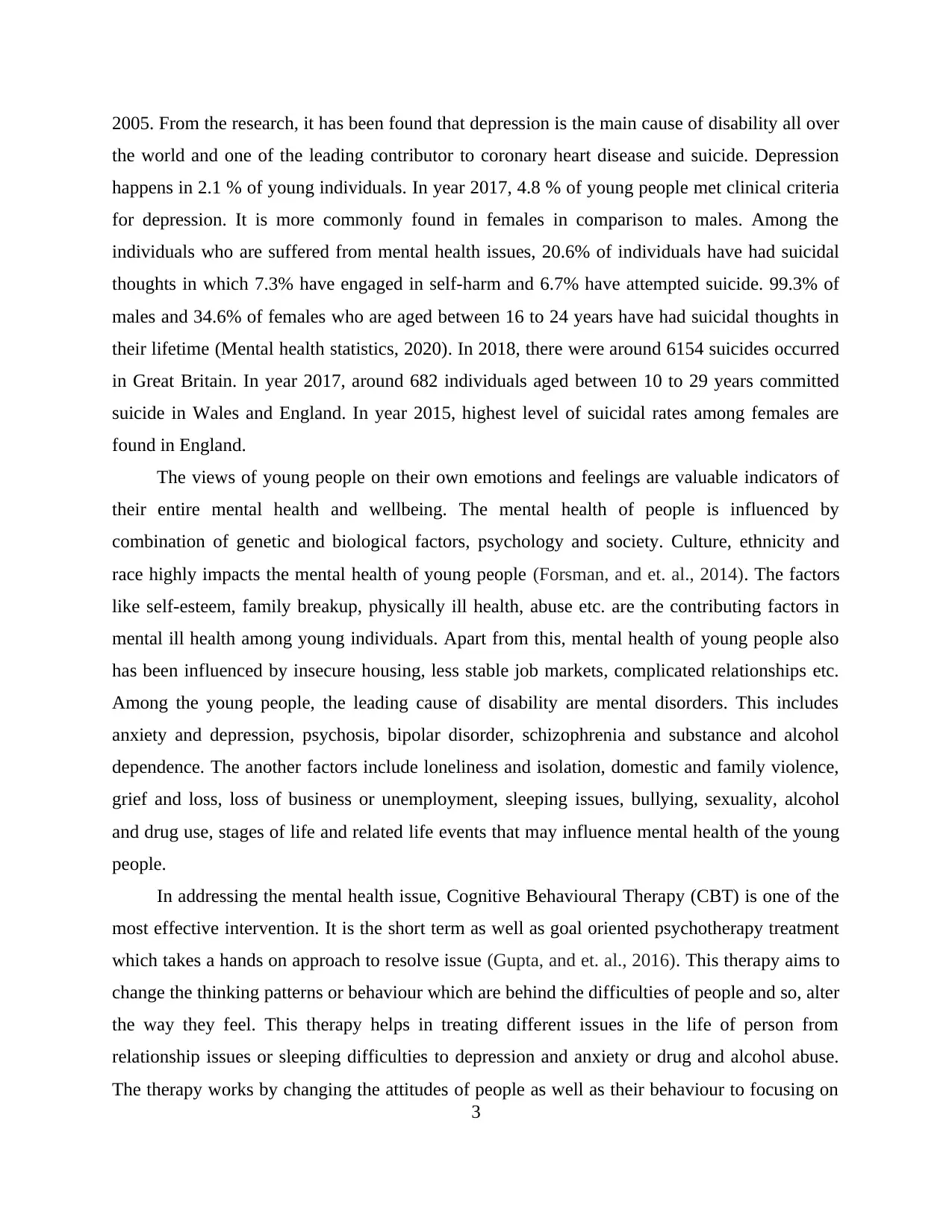
2005. From the research, it has been found that depression is the main cause of disability all over
the world and one of the leading contributor to coronary heart disease and suicide. Depression
happens in 2.1 % of young individuals. In year 2017, 4.8 % of young people met clinical criteria
for depression. It is more commonly found in females in comparison to males. Among the
individuals who are suffered from mental health issues, 20.6% of individuals have had suicidal
thoughts in which 7.3% have engaged in self-harm and 6.7% have attempted suicide. 99.3% of
males and 34.6% of females who are aged between 16 to 24 years have had suicidal thoughts in
their lifetime (Mental health statistics, 2020). In 2018, there were around 6154 suicides occurred
in Great Britain. In year 2017, around 682 individuals aged between 10 to 29 years committed
suicide in Wales and England. In year 2015, highest level of suicidal rates among females are
found in England.
The views of young people on their own emotions and feelings are valuable indicators of
their entire mental health and wellbeing. The mental health of people is influenced by
combination of genetic and biological factors, psychology and society. Culture, ethnicity and
race highly impacts the mental health of young people (Forsman, and et. al., 2014). The factors
like self-esteem, family breakup, physically ill health, abuse etc. are the contributing factors in
mental ill health among young individuals. Apart from this, mental health of young people also
has been influenced by insecure housing, less stable job markets, complicated relationships etc.
Among the young people, the leading cause of disability are mental disorders. This includes
anxiety and depression, psychosis, bipolar disorder, schizophrenia and substance and alcohol
dependence. The another factors include loneliness and isolation, domestic and family violence,
grief and loss, loss of business or unemployment, sleeping issues, bullying, sexuality, alcohol
and drug use, stages of life and related life events that may influence mental health of the young
people.
In addressing the mental health issue, Cognitive Behavioural Therapy (CBT) is one of the
most effective intervention. It is the short term as well as goal oriented psychotherapy treatment
which takes a hands on approach to resolve issue (Gupta, and et. al., 2016). This therapy aims to
change the thinking patterns or behaviour which are behind the difficulties of people and so, alter
the way they feel. This therapy helps in treating different issues in the life of person from
relationship issues or sleeping difficulties to depression and anxiety or drug and alcohol abuse.
The therapy works by changing the attitudes of people as well as their behaviour to focusing on
3
the world and one of the leading contributor to coronary heart disease and suicide. Depression
happens in 2.1 % of young individuals. In year 2017, 4.8 % of young people met clinical criteria
for depression. It is more commonly found in females in comparison to males. Among the
individuals who are suffered from mental health issues, 20.6% of individuals have had suicidal
thoughts in which 7.3% have engaged in self-harm and 6.7% have attempted suicide. 99.3% of
males and 34.6% of females who are aged between 16 to 24 years have had suicidal thoughts in
their lifetime (Mental health statistics, 2020). In 2018, there were around 6154 suicides occurred
in Great Britain. In year 2017, around 682 individuals aged between 10 to 29 years committed
suicide in Wales and England. In year 2015, highest level of suicidal rates among females are
found in England.
The views of young people on their own emotions and feelings are valuable indicators of
their entire mental health and wellbeing. The mental health of people is influenced by
combination of genetic and biological factors, psychology and society. Culture, ethnicity and
race highly impacts the mental health of young people (Forsman, and et. al., 2014). The factors
like self-esteem, family breakup, physically ill health, abuse etc. are the contributing factors in
mental ill health among young individuals. Apart from this, mental health of young people also
has been influenced by insecure housing, less stable job markets, complicated relationships etc.
Among the young people, the leading cause of disability are mental disorders. This includes
anxiety and depression, psychosis, bipolar disorder, schizophrenia and substance and alcohol
dependence. The another factors include loneliness and isolation, domestic and family violence,
grief and loss, loss of business or unemployment, sleeping issues, bullying, sexuality, alcohol
and drug use, stages of life and related life events that may influence mental health of the young
people.
In addressing the mental health issue, Cognitive Behavioural Therapy (CBT) is one of the
most effective intervention. It is the short term as well as goal oriented psychotherapy treatment
which takes a hands on approach to resolve issue (Gupta, and et. al., 2016). This therapy aims to
change the thinking patterns or behaviour which are behind the difficulties of people and so, alter
the way they feel. This therapy helps in treating different issues in the life of person from
relationship issues or sleeping difficulties to depression and anxiety or drug and alcohol abuse.
The therapy works by changing the attitudes of people as well as their behaviour to focusing on
3
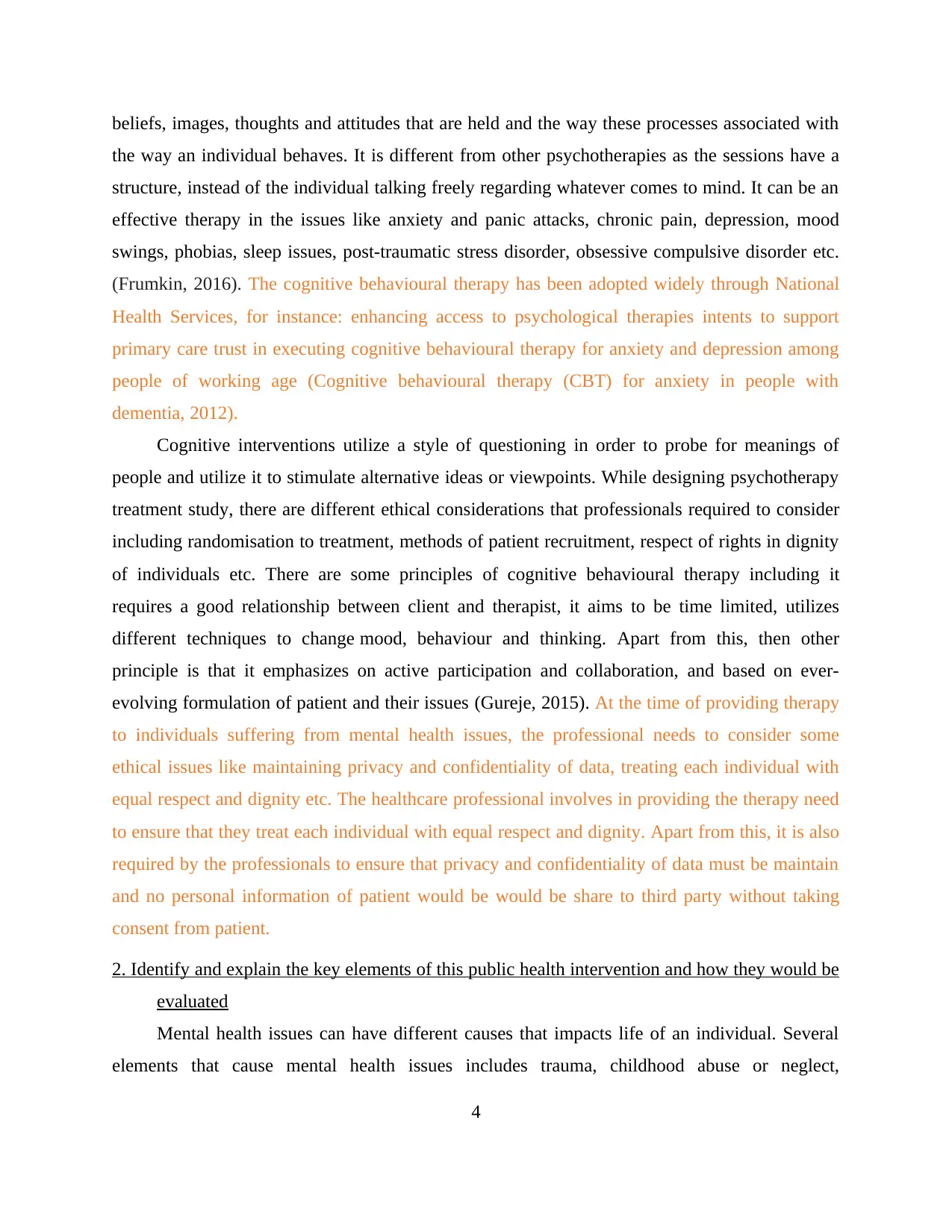
beliefs, images, thoughts and attitudes that are held and the way these processes associated with
the way an individual behaves. It is different from other psychotherapies as the sessions have a
structure, instead of the individual talking freely regarding whatever comes to mind. It can be an
effective therapy in the issues like anxiety and panic attacks, chronic pain, depression, mood
swings, phobias, sleep issues, post-traumatic stress disorder, obsessive compulsive disorder etc.
(Frumkin, 2016). The cognitive behavioural therapy has been adopted widely through National
Health Services, for instance: enhancing access to psychological therapies intents to support
primary care trust in executing cognitive behavioural therapy for anxiety and depression among
people of working age (Cognitive behavioural therapy (CBT) for anxiety in people with
dementia, 2012).
Cognitive interventions utilize a style of questioning in order to probe for meanings of
people and utilize it to stimulate alternative ideas or viewpoints. While designing psychotherapy
treatment study, there are different ethical considerations that professionals required to consider
including randomisation to treatment, methods of patient recruitment, respect of rights in dignity
of individuals etc. There are some principles of cognitive behavioural therapy including it
requires a good relationship between client and therapist, it aims to be time limited, utilizes
different techniques to change mood, behaviour and thinking. Apart from this, then other
principle is that it emphasizes on active participation and collaboration, and based on ever-
evolving formulation of patient and their issues (Gureje, 2015). At the time of providing therapy
to individuals suffering from mental health issues, the professional needs to consider some
ethical issues like maintaining privacy and confidentiality of data, treating each individual with
equal respect and dignity etc. The healthcare professional involves in providing the therapy need
to ensure that they treat each individual with equal respect and dignity. Apart from this, it is also
required by the professionals to ensure that privacy and confidentiality of data must be maintain
and no personal information of patient would be would be share to third party without taking
consent from patient.
2. Identify and explain the key elements of this public health intervention and how they would be
evaluated
Mental health issues can have different causes that impacts life of an individual. Several
elements that cause mental health issues includes trauma, childhood abuse or neglect,
4
the way an individual behaves. It is different from other psychotherapies as the sessions have a
structure, instead of the individual talking freely regarding whatever comes to mind. It can be an
effective therapy in the issues like anxiety and panic attacks, chronic pain, depression, mood
swings, phobias, sleep issues, post-traumatic stress disorder, obsessive compulsive disorder etc.
(Frumkin, 2016). The cognitive behavioural therapy has been adopted widely through National
Health Services, for instance: enhancing access to psychological therapies intents to support
primary care trust in executing cognitive behavioural therapy for anxiety and depression among
people of working age (Cognitive behavioural therapy (CBT) for anxiety in people with
dementia, 2012).
Cognitive interventions utilize a style of questioning in order to probe for meanings of
people and utilize it to stimulate alternative ideas or viewpoints. While designing psychotherapy
treatment study, there are different ethical considerations that professionals required to consider
including randomisation to treatment, methods of patient recruitment, respect of rights in dignity
of individuals etc. There are some principles of cognitive behavioural therapy including it
requires a good relationship between client and therapist, it aims to be time limited, utilizes
different techniques to change mood, behaviour and thinking. Apart from this, then other
principle is that it emphasizes on active participation and collaboration, and based on ever-
evolving formulation of patient and their issues (Gureje, 2015). At the time of providing therapy
to individuals suffering from mental health issues, the professional needs to consider some
ethical issues like maintaining privacy and confidentiality of data, treating each individual with
equal respect and dignity etc. The healthcare professional involves in providing the therapy need
to ensure that they treat each individual with equal respect and dignity. Apart from this, it is also
required by the professionals to ensure that privacy and confidentiality of data must be maintain
and no personal information of patient would be would be share to third party without taking
consent from patient.
2. Identify and explain the key elements of this public health intervention and how they would be
evaluated
Mental health issues can have different causes that impacts life of an individual. Several
elements that cause mental health issues includes trauma, childhood abuse or neglect,
4
⊘ This is a preview!⊘
Do you want full access?
Subscribe today to unlock all pages.

Trusted by 1+ million students worldwide
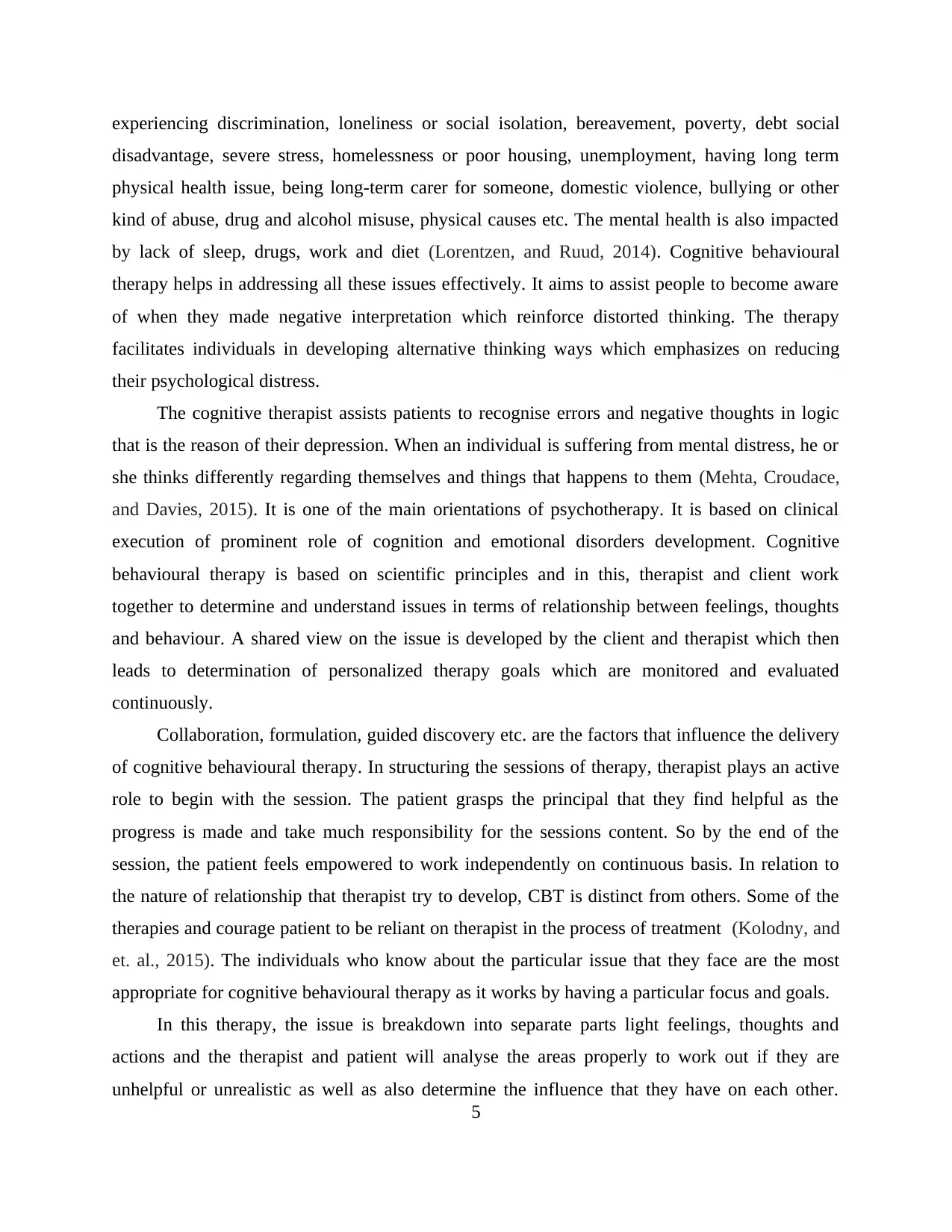
experiencing discrimination, loneliness or social isolation, bereavement, poverty, debt social
disadvantage, severe stress, homelessness or poor housing, unemployment, having long term
physical health issue, being long-term carer for someone, domestic violence, bullying or other
kind of abuse, drug and alcohol misuse, physical causes etc. The mental health is also impacted
by lack of sleep, drugs, work and diet (Lorentzen, and Ruud, 2014). Cognitive behavioural
therapy helps in addressing all these issues effectively. It aims to assist people to become aware
of when they made negative interpretation which reinforce distorted thinking. The therapy
facilitates individuals in developing alternative thinking ways which emphasizes on reducing
their psychological distress.
The cognitive therapist assists patients to recognise errors and negative thoughts in logic
that is the reason of their depression. When an individual is suffering from mental distress, he or
she thinks differently regarding themselves and things that happens to them (Mehta, Croudace,
and Davies, 2015). It is one of the main orientations of psychotherapy. It is based on clinical
execution of prominent role of cognition and emotional disorders development. Cognitive
behavioural therapy is based on scientific principles and in this, therapist and client work
together to determine and understand issues in terms of relationship between feelings, thoughts
and behaviour. A shared view on the issue is developed by the client and therapist which then
leads to determination of personalized therapy goals which are monitored and evaluated
continuously.
Collaboration, formulation, guided discovery etc. are the factors that influence the delivery
of cognitive behavioural therapy. In structuring the sessions of therapy, therapist plays an active
role to begin with the session. The patient grasps the principal that they find helpful as the
progress is made and take much responsibility for the sessions content. So by the end of the
session, the patient feels empowered to work independently on continuous basis. In relation to
the nature of relationship that therapist try to develop, CBT is distinct from others. Some of the
therapies and courage patient to be reliant on therapist in the process of treatment (Kolodny, and
et. al., 2015). The individuals who know about the particular issue that they face are the most
appropriate for cognitive behavioural therapy as it works by having a particular focus and goals.
In this therapy, the issue is breakdown into separate parts light feelings, thoughts and
actions and the therapist and patient will analyse the areas properly to work out if they are
unhelpful or unrealistic as well as also determine the influence that they have on each other.
5
disadvantage, severe stress, homelessness or poor housing, unemployment, having long term
physical health issue, being long-term carer for someone, domestic violence, bullying or other
kind of abuse, drug and alcohol misuse, physical causes etc. The mental health is also impacted
by lack of sleep, drugs, work and diet (Lorentzen, and Ruud, 2014). Cognitive behavioural
therapy helps in addressing all these issues effectively. It aims to assist people to become aware
of when they made negative interpretation which reinforce distorted thinking. The therapy
facilitates individuals in developing alternative thinking ways which emphasizes on reducing
their psychological distress.
The cognitive therapist assists patients to recognise errors and negative thoughts in logic
that is the reason of their depression. When an individual is suffering from mental distress, he or
she thinks differently regarding themselves and things that happens to them (Mehta, Croudace,
and Davies, 2015). It is one of the main orientations of psychotherapy. It is based on clinical
execution of prominent role of cognition and emotional disorders development. Cognitive
behavioural therapy is based on scientific principles and in this, therapist and client work
together to determine and understand issues in terms of relationship between feelings, thoughts
and behaviour. A shared view on the issue is developed by the client and therapist which then
leads to determination of personalized therapy goals which are monitored and evaluated
continuously.
Collaboration, formulation, guided discovery etc. are the factors that influence the delivery
of cognitive behavioural therapy. In structuring the sessions of therapy, therapist plays an active
role to begin with the session. The patient grasps the principal that they find helpful as the
progress is made and take much responsibility for the sessions content. So by the end of the
session, the patient feels empowered to work independently on continuous basis. In relation to
the nature of relationship that therapist try to develop, CBT is distinct from others. Some of the
therapies and courage patient to be reliant on therapist in the process of treatment (Kolodny, and
et. al., 2015). The individuals who know about the particular issue that they face are the most
appropriate for cognitive behavioural therapy as it works by having a particular focus and goals.
In this therapy, the issue is breakdown into separate parts light feelings, thoughts and
actions and the therapist and patient will analyse the areas properly to work out if they are
unhelpful or unrealistic as well as also determine the influence that they have on each other.
5
Paraphrase This Document
Need a fresh take? Get an instant paraphrase of this document with our AI Paraphraser
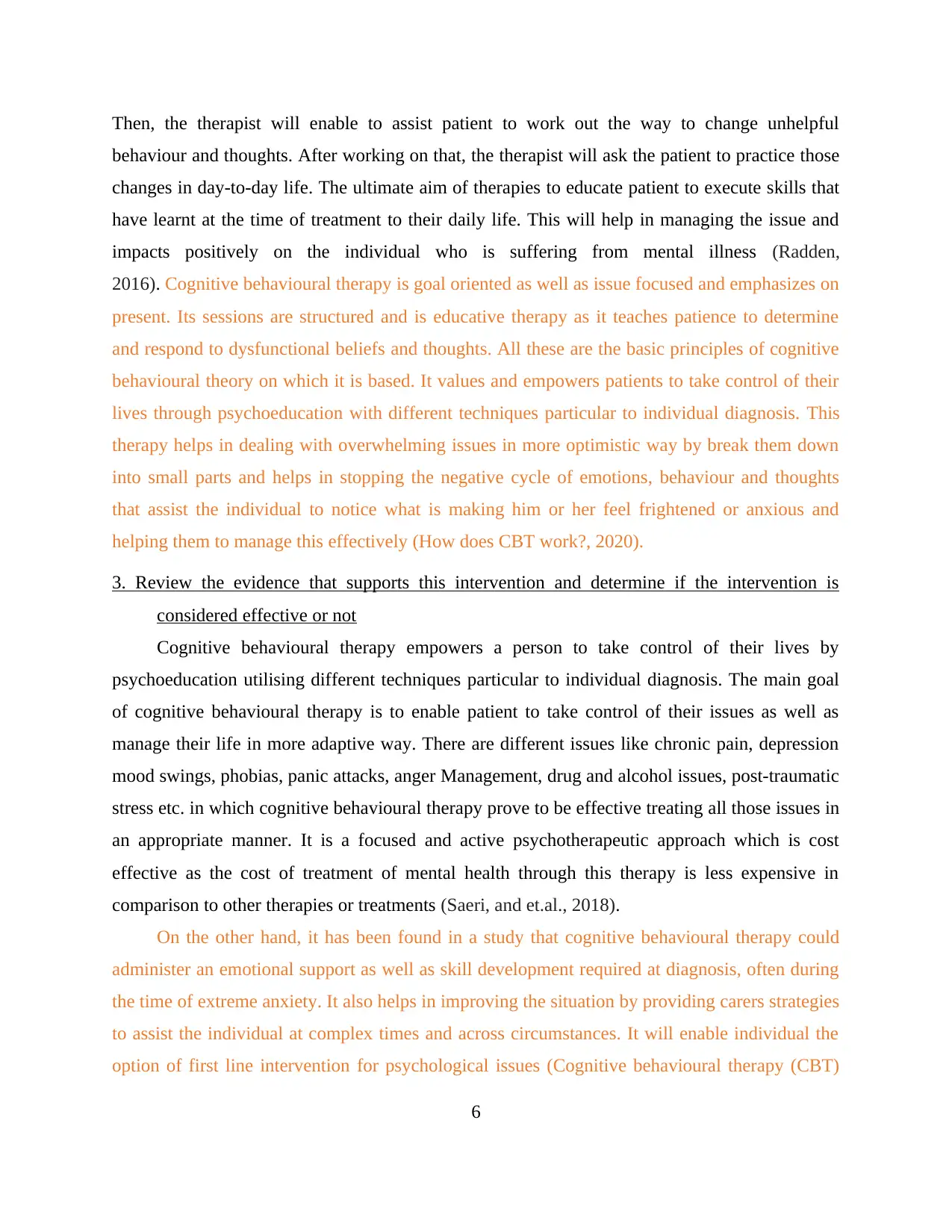
Then, the therapist will enable to assist patient to work out the way to change unhelpful
behaviour and thoughts. After working on that, the therapist will ask the patient to practice those
changes in day-to-day life. The ultimate aim of therapies to educate patient to execute skills that
have learnt at the time of treatment to their daily life. This will help in managing the issue and
impacts positively on the individual who is suffering from mental illness (Radden,
2016). Cognitive behavioural therapy is goal oriented as well as issue focused and emphasizes on
present. Its sessions are structured and is educative therapy as it teaches patience to determine
and respond to dysfunctional beliefs and thoughts. All these are the basic principles of cognitive
behavioural theory on which it is based. It values and empowers patients to take control of their
lives through psychoeducation with different techniques particular to individual diagnosis. This
therapy helps in dealing with overwhelming issues in more optimistic way by break them down
into small parts and helps in stopping the negative cycle of emotions, behaviour and thoughts
that assist the individual to notice what is making him or her feel frightened or anxious and
helping them to manage this effectively (How does CBT work?, 2020).
3. Review the evidence that supports this intervention and determine if the intervention is
considered effective or not
Cognitive behavioural therapy empowers a person to take control of their lives by
psychoeducation utilising different techniques particular to individual diagnosis. The main goal
of cognitive behavioural therapy is to enable patient to take control of their issues as well as
manage their life in more adaptive way. There are different issues like chronic pain, depression
mood swings, phobias, panic attacks, anger Management, drug and alcohol issues, post-traumatic
stress etc. in which cognitive behavioural therapy prove to be effective treating all those issues in
an appropriate manner. It is a focused and active psychotherapeutic approach which is cost
effective as the cost of treatment of mental health through this therapy is less expensive in
comparison to other therapies or treatments (Saeri, and et.al., 2018).
On the other hand, it has been found in a study that cognitive behavioural therapy could
administer an emotional support as well as skill development required at diagnosis, often during
the time of extreme anxiety. It also helps in improving the situation by providing carers strategies
to assist the individual at complex times and across circumstances. It will enable individual the
option of first line intervention for psychological issues (Cognitive behavioural therapy (CBT)
6
behaviour and thoughts. After working on that, the therapist will ask the patient to practice those
changes in day-to-day life. The ultimate aim of therapies to educate patient to execute skills that
have learnt at the time of treatment to their daily life. This will help in managing the issue and
impacts positively on the individual who is suffering from mental illness (Radden,
2016). Cognitive behavioural therapy is goal oriented as well as issue focused and emphasizes on
present. Its sessions are structured and is educative therapy as it teaches patience to determine
and respond to dysfunctional beliefs and thoughts. All these are the basic principles of cognitive
behavioural theory on which it is based. It values and empowers patients to take control of their
lives through psychoeducation with different techniques particular to individual diagnosis. This
therapy helps in dealing with overwhelming issues in more optimistic way by break them down
into small parts and helps in stopping the negative cycle of emotions, behaviour and thoughts
that assist the individual to notice what is making him or her feel frightened or anxious and
helping them to manage this effectively (How does CBT work?, 2020).
3. Review the evidence that supports this intervention and determine if the intervention is
considered effective or not
Cognitive behavioural therapy empowers a person to take control of their lives by
psychoeducation utilising different techniques particular to individual diagnosis. The main goal
of cognitive behavioural therapy is to enable patient to take control of their issues as well as
manage their life in more adaptive way. There are different issues like chronic pain, depression
mood swings, phobias, panic attacks, anger Management, drug and alcohol issues, post-traumatic
stress etc. in which cognitive behavioural therapy prove to be effective treating all those issues in
an appropriate manner. It is a focused and active psychotherapeutic approach which is cost
effective as the cost of treatment of mental health through this therapy is less expensive in
comparison to other therapies or treatments (Saeri, and et.al., 2018).
On the other hand, it has been found in a study that cognitive behavioural therapy could
administer an emotional support as well as skill development required at diagnosis, often during
the time of extreme anxiety. It also helps in improving the situation by providing carers strategies
to assist the individual at complex times and across circumstances. It will enable individual the
option of first line intervention for psychological issues (Cognitive behavioural therapy (CBT)
6
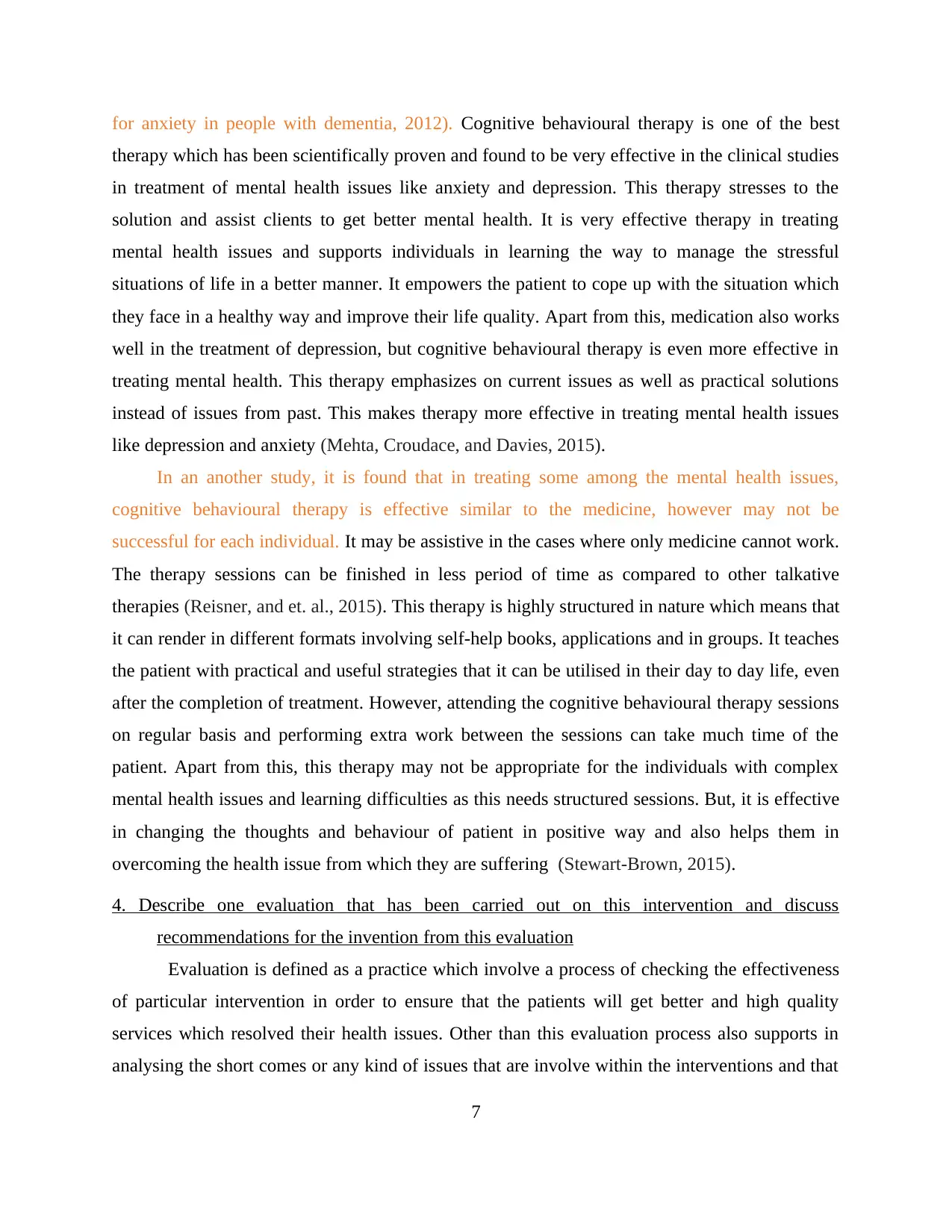
for anxiety in people with dementia, 2012). Cognitive behavioural therapy is one of the best
therapy which has been scientifically proven and found to be very effective in the clinical studies
in treatment of mental health issues like anxiety and depression. This therapy stresses to the
solution and assist clients to get better mental health. It is very effective therapy in treating
mental health issues and supports individuals in learning the way to manage the stressful
situations of life in a better manner. It empowers the patient to cope up with the situation which
they face in a healthy way and improve their life quality. Apart from this, medication also works
well in the treatment of depression, but cognitive behavioural therapy is even more effective in
treating mental health. This therapy emphasizes on current issues as well as practical solutions
instead of issues from past. This makes therapy more effective in treating mental health issues
like depression and anxiety (Mehta, Croudace, and Davies, 2015).
In an another study, it is found that in treating some among the mental health issues,
cognitive behavioural therapy is effective similar to the medicine, however may not be
successful for each individual. It may be assistive in the cases where only medicine cannot work.
The therapy sessions can be finished in less period of time as compared to other talkative
therapies (Reisner, and et. al., 2015). This therapy is highly structured in nature which means that
it can render in different formats involving self-help books, applications and in groups. It teaches
the patient with practical and useful strategies that it can be utilised in their day to day life, even
after the completion of treatment. However, attending the cognitive behavioural therapy sessions
on regular basis and performing extra work between the sessions can take much time of the
patient. Apart from this, this therapy may not be appropriate for the individuals with complex
mental health issues and learning difficulties as this needs structured sessions. But, it is effective
in changing the thoughts and behaviour of patient in positive way and also helps them in
overcoming the health issue from which they are suffering (Stewart-Brown, 2015).
4. Describe one evaluation that has been carried out on this intervention and discuss
recommendations for the invention from this evaluation
Evaluation is defined as a practice which involve a process of checking the effectiveness
of particular intervention in order to ensure that the patients will get better and high quality
services which resolved their health issues. Other than this evaluation process also supports in
analysing the short comes or any kind of issues that are involve within the interventions and that
7
therapy which has been scientifically proven and found to be very effective in the clinical studies
in treatment of mental health issues like anxiety and depression. This therapy stresses to the
solution and assist clients to get better mental health. It is very effective therapy in treating
mental health issues and supports individuals in learning the way to manage the stressful
situations of life in a better manner. It empowers the patient to cope up with the situation which
they face in a healthy way and improve their life quality. Apart from this, medication also works
well in the treatment of depression, but cognitive behavioural therapy is even more effective in
treating mental health. This therapy emphasizes on current issues as well as practical solutions
instead of issues from past. This makes therapy more effective in treating mental health issues
like depression and anxiety (Mehta, Croudace, and Davies, 2015).
In an another study, it is found that in treating some among the mental health issues,
cognitive behavioural therapy is effective similar to the medicine, however may not be
successful for each individual. It may be assistive in the cases where only medicine cannot work.
The therapy sessions can be finished in less period of time as compared to other talkative
therapies (Reisner, and et. al., 2015). This therapy is highly structured in nature which means that
it can render in different formats involving self-help books, applications and in groups. It teaches
the patient with practical and useful strategies that it can be utilised in their day to day life, even
after the completion of treatment. However, attending the cognitive behavioural therapy sessions
on regular basis and performing extra work between the sessions can take much time of the
patient. Apart from this, this therapy may not be appropriate for the individuals with complex
mental health issues and learning difficulties as this needs structured sessions. But, it is effective
in changing the thoughts and behaviour of patient in positive way and also helps them in
overcoming the health issue from which they are suffering (Stewart-Brown, 2015).
4. Describe one evaluation that has been carried out on this intervention and discuss
recommendations for the invention from this evaluation
Evaluation is defined as a practice which involve a process of checking the effectiveness
of particular intervention in order to ensure that the patients will get better and high quality
services which resolved their health issues. Other than this evaluation process also supports in
analysing the short comes or any kind of issues that are involve within the interventions and that
7
⊘ This is a preview!⊘
Do you want full access?
Subscribe today to unlock all pages.

Trusted by 1+ million students worldwide
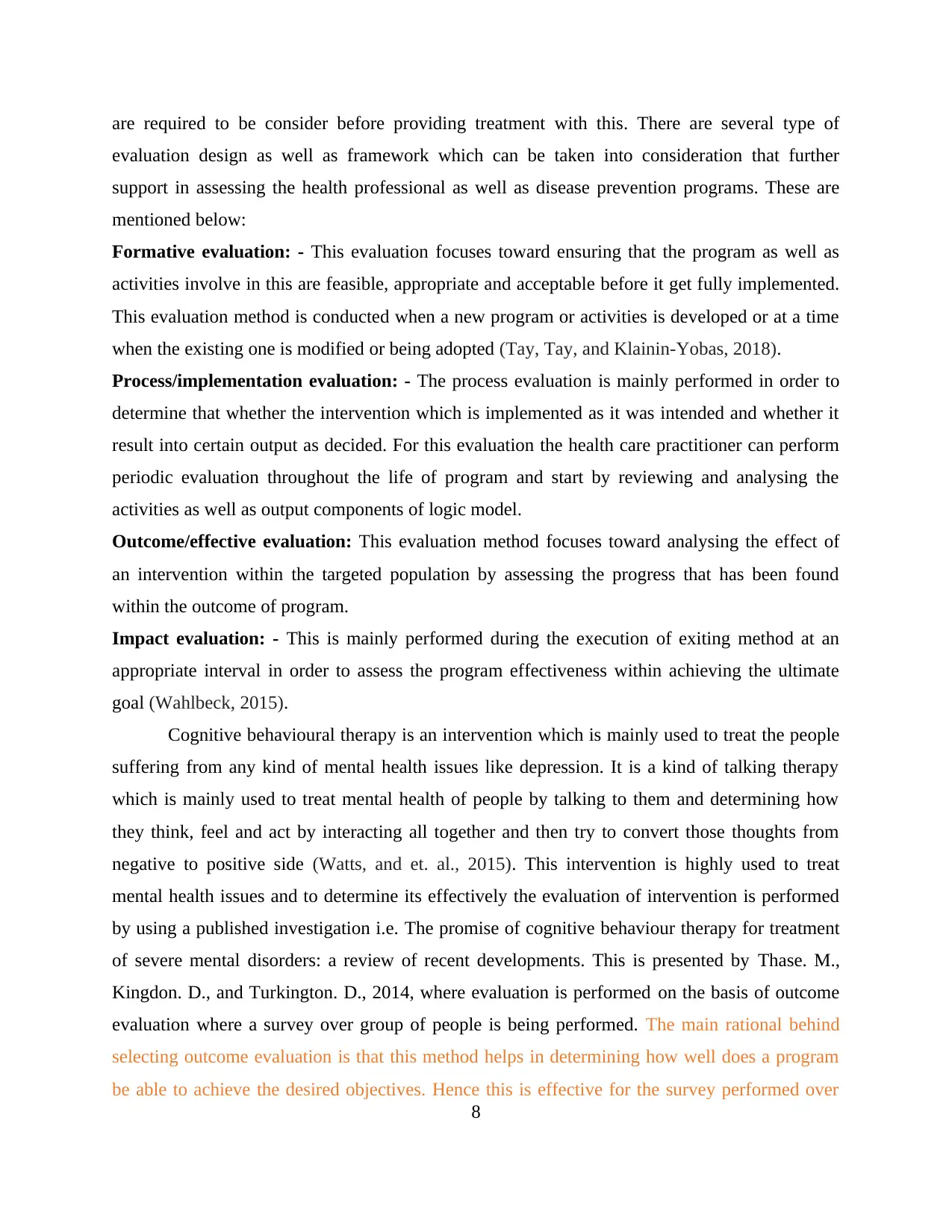
are required to be consider before providing treatment with this. There are several type of
evaluation design as well as framework which can be taken into consideration that further
support in assessing the health professional as well as disease prevention programs. These are
mentioned below:
Formative evaluation: - This evaluation focuses toward ensuring that the program as well as
activities involve in this are feasible, appropriate and acceptable before it get fully implemented.
This evaluation method is conducted when a new program or activities is developed or at a time
when the existing one is modified or being adopted (Tay, Tay, and Klainin-Yobas, 2018).
Process/implementation evaluation: - The process evaluation is mainly performed in order to
determine that whether the intervention which is implemented as it was intended and whether it
result into certain output as decided. For this evaluation the health care practitioner can perform
periodic evaluation throughout the life of program and start by reviewing and analysing the
activities as well as output components of logic model.
Outcome/effective evaluation: This evaluation method focuses toward analysing the effect of
an intervention within the targeted population by assessing the progress that has been found
within the outcome of program.
Impact evaluation: - This is mainly performed during the execution of exiting method at an
appropriate interval in order to assess the program effectiveness within achieving the ultimate
goal (Wahlbeck, 2015).
Cognitive behavioural therapy is an intervention which is mainly used to treat the people
suffering from any kind of mental health issues like depression. It is a kind of talking therapy
which is mainly used to treat mental health of people by talking to them and determining how
they think, feel and act by interacting all together and then try to convert those thoughts from
negative to positive side (Watts, and et. al., 2015). This intervention is highly used to treat
mental health issues and to determine its effectively the evaluation of intervention is performed
by using a published investigation i.e. The promise of cognitive behaviour therapy for treatment
of severe mental disorders: a review of recent developments. This is presented by Thase. M.,
Kingdon. D., and Turkington. D., 2014, where evaluation is performed on the basis of outcome
evaluation where a survey over group of people is being performed. The main rational behind
selecting outcome evaluation is that this method helps in determining how well does a program
be able to achieve the desired objectives. Hence this is effective for the survey performed over
8
evaluation design as well as framework which can be taken into consideration that further
support in assessing the health professional as well as disease prevention programs. These are
mentioned below:
Formative evaluation: - This evaluation focuses toward ensuring that the program as well as
activities involve in this are feasible, appropriate and acceptable before it get fully implemented.
This evaluation method is conducted when a new program or activities is developed or at a time
when the existing one is modified or being adopted (Tay, Tay, and Klainin-Yobas, 2018).
Process/implementation evaluation: - The process evaluation is mainly performed in order to
determine that whether the intervention which is implemented as it was intended and whether it
result into certain output as decided. For this evaluation the health care practitioner can perform
periodic evaluation throughout the life of program and start by reviewing and analysing the
activities as well as output components of logic model.
Outcome/effective evaluation: This evaluation method focuses toward analysing the effect of
an intervention within the targeted population by assessing the progress that has been found
within the outcome of program.
Impact evaluation: - This is mainly performed during the execution of exiting method at an
appropriate interval in order to assess the program effectiveness within achieving the ultimate
goal (Wahlbeck, 2015).
Cognitive behavioural therapy is an intervention which is mainly used to treat the people
suffering from any kind of mental health issues like depression. It is a kind of talking therapy
which is mainly used to treat mental health of people by talking to them and determining how
they think, feel and act by interacting all together and then try to convert those thoughts from
negative to positive side (Watts, and et. al., 2015). This intervention is highly used to treat
mental health issues and to determine its effectively the evaluation of intervention is performed
by using a published investigation i.e. The promise of cognitive behaviour therapy for treatment
of severe mental disorders: a review of recent developments. This is presented by Thase. M.,
Kingdon. D., and Turkington. D., 2014, where evaluation is performed on the basis of outcome
evaluation where a survey over group of people is being performed. The main rational behind
selecting outcome evaluation is that this method helps in determining how well does a program
be able to achieve the desired objectives. Hence this is effective for the survey performed over
8
Paraphrase This Document
Need a fresh take? Get an instant paraphrase of this document with our AI Paraphraser
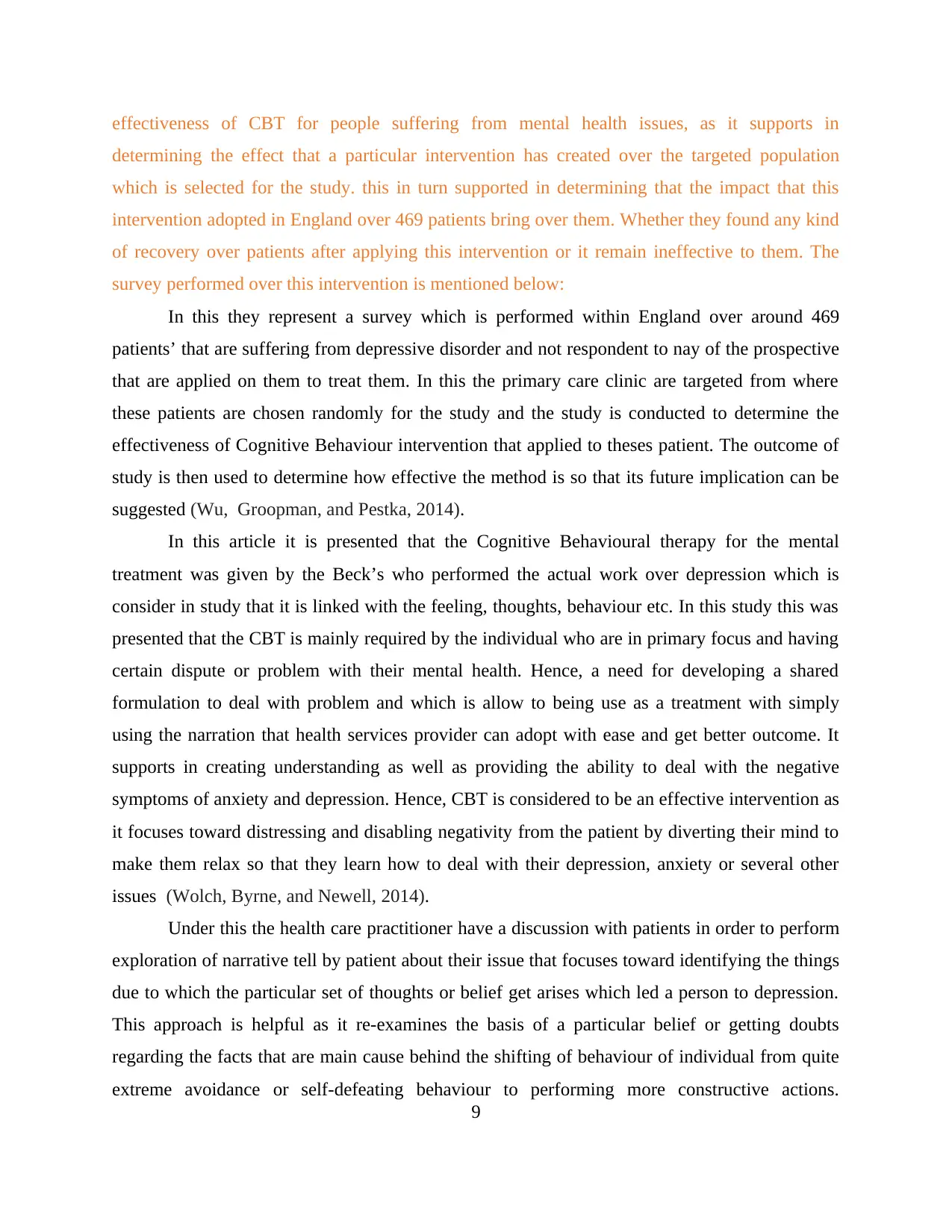
effectiveness of CBT for people suffering from mental health issues, as it supports in
determining the effect that a particular intervention has created over the targeted population
which is selected for the study. this in turn supported in determining that the impact that this
intervention adopted in England over 469 patients bring over them. Whether they found any kind
of recovery over patients after applying this intervention or it remain ineffective to them. The
survey performed over this intervention is mentioned below:
In this they represent a survey which is performed within England over around 469
patients’ that are suffering from depressive disorder and not respondent to nay of the prospective
that are applied on them to treat them. In this the primary care clinic are targeted from where
these patients are chosen randomly for the study and the study is conducted to determine the
effectiveness of Cognitive Behaviour intervention that applied to theses patient. The outcome of
study is then used to determine how effective the method is so that its future implication can be
suggested (Wu, Groopman, and Pestka, 2014).
In this article it is presented that the Cognitive Behavioural therapy for the mental
treatment was given by the Beck’s who performed the actual work over depression which is
consider in study that it is linked with the feeling, thoughts, behaviour etc. In this study this was
presented that the CBT is mainly required by the individual who are in primary focus and having
certain dispute or problem with their mental health. Hence, a need for developing a shared
formulation to deal with problem and which is allow to being use as a treatment with simply
using the narration that health services provider can adopt with ease and get better outcome. It
supports in creating understanding as well as providing the ability to deal with the negative
symptoms of anxiety and depression. Hence, CBT is considered to be an effective intervention as
it focuses toward distressing and disabling negativity from the patient by diverting their mind to
make them relax so that they learn how to deal with their depression, anxiety or several other
issues (Wolch, Byrne, and Newell, 2014).
Under this the health care practitioner have a discussion with patients in order to perform
exploration of narrative tell by patient about their issue that focuses toward identifying the things
due to which the particular set of thoughts or belief get arises which led a person to depression.
This approach is helpful as it re-examines the basis of a particular belief or getting doubts
regarding the facts that are main cause behind the shifting of behaviour of individual from quite
extreme avoidance or self-defeating behaviour to performing more constructive actions.
9
determining the effect that a particular intervention has created over the targeted population
which is selected for the study. this in turn supported in determining that the impact that this
intervention adopted in England over 469 patients bring over them. Whether they found any kind
of recovery over patients after applying this intervention or it remain ineffective to them. The
survey performed over this intervention is mentioned below:
In this they represent a survey which is performed within England over around 469
patients’ that are suffering from depressive disorder and not respondent to nay of the prospective
that are applied on them to treat them. In this the primary care clinic are targeted from where
these patients are chosen randomly for the study and the study is conducted to determine the
effectiveness of Cognitive Behaviour intervention that applied to theses patient. The outcome of
study is then used to determine how effective the method is so that its future implication can be
suggested (Wu, Groopman, and Pestka, 2014).
In this article it is presented that the Cognitive Behavioural therapy for the mental
treatment was given by the Beck’s who performed the actual work over depression which is
consider in study that it is linked with the feeling, thoughts, behaviour etc. In this study this was
presented that the CBT is mainly required by the individual who are in primary focus and having
certain dispute or problem with their mental health. Hence, a need for developing a shared
formulation to deal with problem and which is allow to being use as a treatment with simply
using the narration that health services provider can adopt with ease and get better outcome. It
supports in creating understanding as well as providing the ability to deal with the negative
symptoms of anxiety and depression. Hence, CBT is considered to be an effective intervention as
it focuses toward distressing and disabling negativity from the patient by diverting their mind to
make them relax so that they learn how to deal with their depression, anxiety or several other
issues (Wolch, Byrne, and Newell, 2014).
Under this the health care practitioner have a discussion with patients in order to perform
exploration of narrative tell by patient about their issue that focuses toward identifying the things
due to which the particular set of thoughts or belief get arises which led a person to depression.
This approach is helpful as it re-examines the basis of a particular belief or getting doubts
regarding the facts that are main cause behind the shifting of behaviour of individual from quite
extreme avoidance or self-defeating behaviour to performing more constructive actions.
9
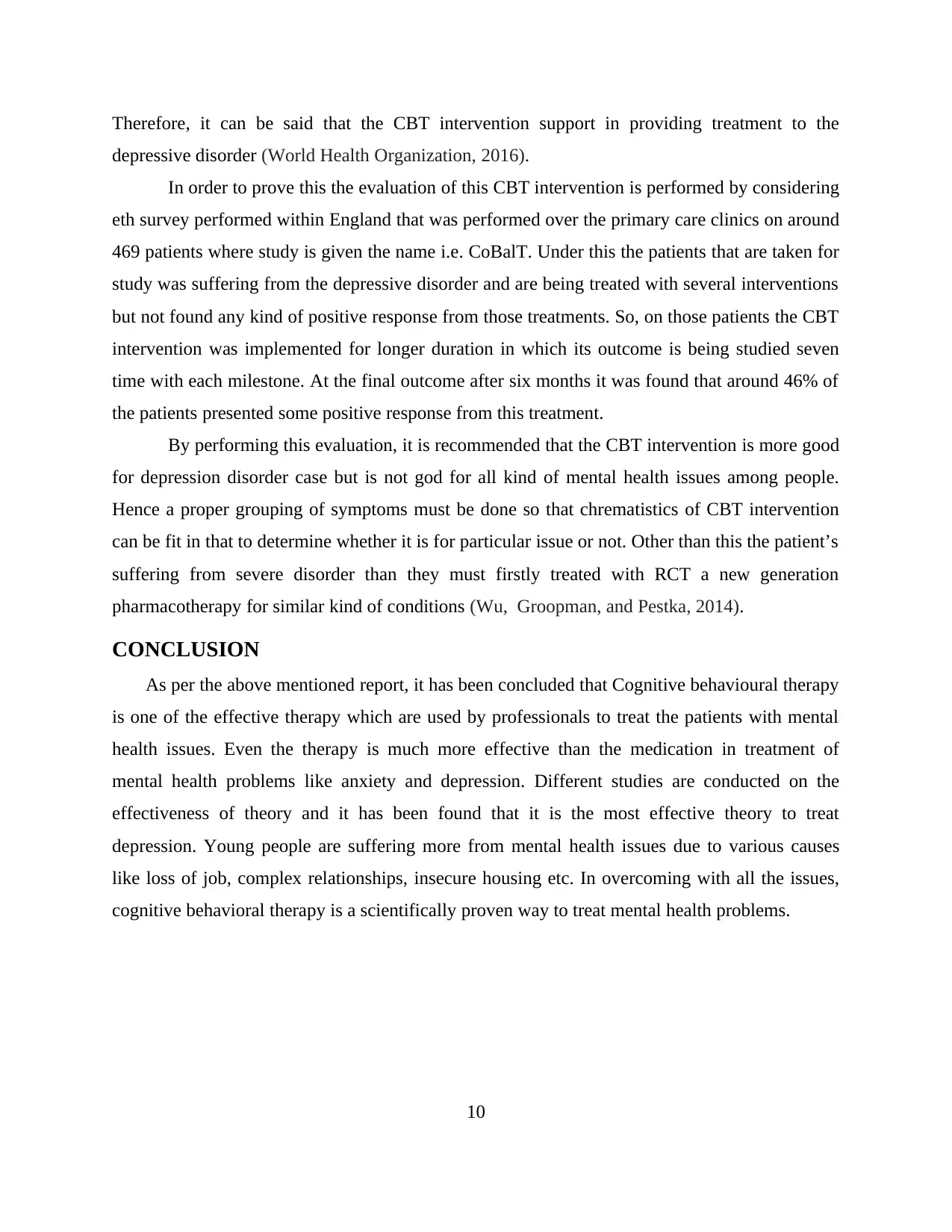
Therefore, it can be said that the CBT intervention support in providing treatment to the
depressive disorder (World Health Organization, 2016).
In order to prove this the evaluation of this CBT intervention is performed by considering
eth survey performed within England that was performed over the primary care clinics on around
469 patients where study is given the name i.e. CoBalT. Under this the patients that are taken for
study was suffering from the depressive disorder and are being treated with several interventions
but not found any kind of positive response from those treatments. So, on those patients the CBT
intervention was implemented for longer duration in which its outcome is being studied seven
time with each milestone. At the final outcome after six months it was found that around 46% of
the patients presented some positive response from this treatment.
By performing this evaluation, it is recommended that the CBT intervention is more good
for depression disorder case but is not god for all kind of mental health issues among people.
Hence a proper grouping of symptoms must be done so that chrematistics of CBT intervention
can be fit in that to determine whether it is for particular issue or not. Other than this the patient’s
suffering from severe disorder than they must firstly treated with RCT a new generation
pharmacotherapy for similar kind of conditions (Wu, Groopman, and Pestka, 2014).
CONCLUSION
As per the above mentioned report, it has been concluded that Cognitive behavioural therapy
is one of the effective therapy which are used by professionals to treat the patients with mental
health issues. Even the therapy is much more effective than the medication in treatment of
mental health problems like anxiety and depression. Different studies are conducted on the
effectiveness of theory and it has been found that it is the most effective theory to treat
depression. Young people are suffering more from mental health issues due to various causes
like loss of job, complex relationships, insecure housing etc. In overcoming with all the issues,
cognitive behavioral therapy is a scientifically proven way to treat mental health problems.
10
depressive disorder (World Health Organization, 2016).
In order to prove this the evaluation of this CBT intervention is performed by considering
eth survey performed within England that was performed over the primary care clinics on around
469 patients where study is given the name i.e. CoBalT. Under this the patients that are taken for
study was suffering from the depressive disorder and are being treated with several interventions
but not found any kind of positive response from those treatments. So, on those patients the CBT
intervention was implemented for longer duration in which its outcome is being studied seven
time with each milestone. At the final outcome after six months it was found that around 46% of
the patients presented some positive response from this treatment.
By performing this evaluation, it is recommended that the CBT intervention is more good
for depression disorder case but is not god for all kind of mental health issues among people.
Hence a proper grouping of symptoms must be done so that chrematistics of CBT intervention
can be fit in that to determine whether it is for particular issue or not. Other than this the patient’s
suffering from severe disorder than they must firstly treated with RCT a new generation
pharmacotherapy for similar kind of conditions (Wu, Groopman, and Pestka, 2014).
CONCLUSION
As per the above mentioned report, it has been concluded that Cognitive behavioural therapy
is one of the effective therapy which are used by professionals to treat the patients with mental
health issues. Even the therapy is much more effective than the medication in treatment of
mental health problems like anxiety and depression. Different studies are conducted on the
effectiveness of theory and it has been found that it is the most effective theory to treat
depression. Young people are suffering more from mental health issues due to various causes
like loss of job, complex relationships, insecure housing etc. In overcoming with all the issues,
cognitive behavioral therapy is a scientifically proven way to treat mental health problems.
10
⊘ This is a preview!⊘
Do you want full access?
Subscribe today to unlock all pages.

Trusted by 1+ million students worldwide
1 out of 14
Related Documents
Your All-in-One AI-Powered Toolkit for Academic Success.
+13062052269
info@desklib.com
Available 24*7 on WhatsApp / Email
![[object Object]](/_next/static/media/star-bottom.7253800d.svg)
Unlock your academic potential
Copyright © 2020–2026 A2Z Services. All Rights Reserved. Developed and managed by ZUCOL.





